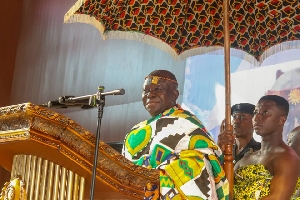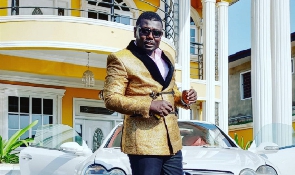Opinions of Sunday, 22 August 2010
Columnist: Bokor, Michael J. K.
Because the law is an ass…
By Dr. Michael J.K. Bokor
E-mail: mjbokor@yahoo.com
August 18, 2010
It is not for nothing that the maxim that “the law is an ass” has gained currency. And as someone once said, the bigger the legal case, the bigger its ass-ness! We’ve heard this maxim before and understood it in several ways. I am convinced that this “ass” that the law is doesn’t refer to the human backside (as it is spelt in American English or the British version of “arse”). It must be an ass (a donkey), which is known for its proverbial foolishness and stubbornness. But what is the relationship between the code that human beings enunciate to regulate their behaviour and the nature of that beast-of-burden?
The recent verdict in the matter concerning Wereko-Brobbey and Kwadwo Mpiani seems to have let loose that ass-ness; and judging from the ripples that this verdict has caused in the ocean of public opinions, there is no doubt that the ass-ness of the law has broken bounds. I am not a lawyer nor do I want to assume any incontrovertible knowledge about the laws of Ghana and how they should be interpreted or enforced. But from the tension that has been caused by this verdict, I am certain that there is an overarching ass-ness somewhere in the workings of the law, which seems to be influencing people’s moods and leading the government (or the NDC) and its opponents on a dangerous collision course.
My scrutiny of Justice Marful-Sau’s ruling leads me to conclude that the ass-ness of the law is in full swing. How is that possible? Through technicalities—and there are many of them in our legal system, based on the intricacies of the laws themselves and reinforced by the web of prosecutorial work. Wereko-Brobbey and Mpiani are given reprieve because of the failure of the Ministry of Justice and Attorney-General’s Office to do a diligent work as far as the technicalities of the law are concerned. In effect, the technicalities embedded in the legal processes are responsible for this verdict. Dr. Busia’s infamous “No Court! No Court!!” expletive may be recalled at this stage as a demonstration of his frustration over such technicalities. We haven’t yet had any cause to worry that President Mills will go that same way to endanger the well-being of the Judiciary.
But there are disturbing undercurrents. Dr. Kwabena Adjei, the National Chairman of the NDC, has inflamed passions over the issue. Unable to contain the frustration anymore, he blurted out that the judiciary was biased towards the ruling party and called on the Chief Justice to clean her house or the party would advise itself. This curt statement is serious enough to worry about.
Dr. Adjei’s utterances may be seen as a blooper but they are worrisome, especially considering the fact that there is already a precedent to be scared of. I am talking about the dastardly abduction and murder of the three High Court Judges in 1982, the remembrance of which has continued to feature in the Ghana Bar Association’s annual calendar of activities (“Martyrs Day,” June 30). It is obvious that anything that has the potential to re-open wounds will evoke anger, which is happening in connection with the NDC Chairman’s utterances.
Diverse responses from Ghanaians to Justice Marful-Sau’s ruling are tinged with politically induced sentiments. While the entire NPP membership hailed the judgement and upheld it as a vindication of the rule of law, those in the NDC saw it as disturbing and have bared their teeth, even at their own government for not doing diligent work to win the cases being prosecuted. From the comments of the NDC functionaries, it is obvious that they are unhappy with the performance of the Ministry of Justice and Attorney-General’s Office. They are agitating for the removal of the Minister from office.
Doubtless, Dr. Adjei’s outburst has become a “foot-and-mouth” disease whose effect is already being registered. Comments from some people and institutions don’t favour him and the government. While Sam Okudjeto saw it as a display of “childishness,” the government distanced itself from it, seeing it as a pure party matter that didn’t reflect its position. The government has given the assurance to provide maximum security for personnel of the Judiciary; but the Ashanti Regional branch of the Ghana Bar Association took matters to the extreme and has begun an indefinite strike action in protest.
These developments are further raising tension and creating the unfortunate impression that Ghanaians are not managing their affairs properly. Any astute observer can read deeper meanings into these developments to draw valid conclusions. What may appear superficially to be a genuine desire to ensure orderliness in the body politic has no doubt assumed a huge partisan political dimension. The upshot is that the fire that has been stoked by Dr. Adjei’s expression of frustration will not die soon.
But I think that some people are rushing matters. It shouldn’t be so. Taking away the part of Dr. Adjei’s utterance which suggests that the NDC would take a unilateral action to purge the Judiciary if the Chief Justice doesn’t proactively do so, what he is being flayed for saying isn’t any far different from the unquantifiable complaints against the Judiciary that we have already heard over the years.
Our Chief Justices themselves (including the late Justice Acquah and the current one, Justice Georgina Wood) are on record as having identified corruption and other vices as prevalent in the Judiciary and subverting the justice delivery mechanism. Where there is corruption (which is not restricted to only the giving and taking of money but also biased decisions by Judges who have been compromised by their political interests and other considerations), justice delivery will surely suffer. They have cautioned members of the Judiciary to turn a new leaf or be exposed and punished. So, what is new about Dr. Adjei’s complaints against the Judiciary for which he should be flayed, if anything at all?
I have also written a three-part article (“Confronting Ghana's Main Problems: The Judiciary”), raising similar concerns and asking for the Judiciary to be cleansed. I gave several instances of inadequacies and outright lapses to suggest that the Judiciary isn’t strong enough to contribute its quota to enhance our democracy. Other people have also aired similar views without matters being taken to this extent. Are those at Dr. Adjei’s throat doing so because he is presenting matters through the lens of the NDC or that they have evidence to confirm that the NDC will physically destroy the Judiciary?
Certainly, there is disquiet in the NDC over all these cases involving their political opponents that have been determined in their favour. Some NDC functionaries are still unhappy that President Mills retained the current Chief Justice in office because they felt the circumstances under which Kufuor appointed her to office were disorienting. One was that she was not the senior-most in rank and, therefore, not the rightful choice for the position. Another was that the fruitless inquiry into the cocaine episode by the Georgina Wood Commission, which she chaired, did not create a favourable impression for her.
Again, some allegations of impropriety levelled against her by a woman who claimed that the she had abused her powers to help her father unduly expropriate her landed property—which Georgina Wood didn’t contest—cast a huge slur over her reputation. In sum, those agitating for the removal of the Chief Justice had good grounds to doubt her integrity. But President Mills didn’t budge and has retained her in office to date. Then, she has appointed Judges whose verdict in cases have gone against the government. Dr. Adjei’s utterances should be analyzed within this circumstance even though any urge to condemn the Judiciary is misplaced. The onus lies on the Ministry of Justice and Attorney-General’s Office.
Nonetheless, opponents of Dr. Adjei should be circumspect. In a democracy, the citizens are free to air their views on issues of interest to them, regardless of where such issues emanate from. We’ve heard this refrain from NPP followers, especially in the matter concerning Nana Kofi Darkwa. Why don’t those condemning Dr. Adjei (most of whom are known NPP adherents) want people to express their dismay at the court verdicts that have ruffled their feathers?
Quite intriguingly, the NPP functionaries are on record to have made several prejudicial comments about court cases without bothering to care about their implications. Take, for instance, the trial of Wereko-Brobbey and Kwadwo Mpiani. Knowing very well that the matter was “sub judice,” no less personalities than ex-President Kufuor and other prominent personalities in the NPP condemned their prosecution and launched scathing verbal attacks on the government and Ministry of Justice and the Attorney-General’s Office. Some of these pronouncements were veiled threats. What did those now at Dr. Adjei’s throat (the Ghana Bar Association, especially) say in reaction?
The indefinite strike action by the Ashanti Regional branch of the Ghana Bar Association is rash and misplaced. Its suddenness (regardless of the so-called emergency meeting held in Kumasi today) belies an insidious, premeditated, and orchestrated move to create needless tension. I see it as part of the dirty politics that the opponents of the government want to do to serve the NPP’s political needs. After all, from the branch chairman’s utterances, we are given to know that the national branch of the GBA hasn’t yet decided what action to take in reaction to the alleged threat from the NDC Chairman. Why, then, the rash indefinite strike? Granted that the matter is a national one and that the Ashanti Regional branch of the GBA is not autonomous enough to take a unilateral action of this sort, why couldn’t the members wait for the National Executive Officers of the GBA to determine what the association should do to make its voice heard?
Again, going a bit back into the matter concerning the fate of the Judiciary, when the Kufuor government reacted in a vitriolic manner to the verdict of the Supreme Court that declared the Fast Track Courts as unconstitutional and packed the Court to win a favourable verdict, what did the GBA do? Did it not see such a political move as endangering the Judiciary to react to as it is now doing in this genuine expression of frustration by the NDC Chairman? One can see a clear display of deplorable double standards.
There are better ways to handle the matter than this age-old tactics of the GBA to undermine the government. But should we be surprised at what is unfolding? As a politically-active pressure group, the GBA has been embroiled in controversial issues that reflected poorly on its integrity and claim of political neutrality. There are historical antecedents. The GBA did such things under the Acheampong government and in the days of the PNDC. What it is re-enacting today is just part of the already-known head-butting manouevres in its arsenal. After all, some of the prominent members of the GBA are known adherents of the NPP who will do all they can to score political points against the NDC.
I wonder what will happen if the October 20, 2010 deadline for Wereko-Brobbey and Mpiani to appeal against the findings of the Justice Duose Commission elapses or when the State hauls them before court again. Unfortunate as Dr. Adjei’s pronouncements are, no one should use them as a smokescreen behind which to prosecute any hidden political agenda. Our democracy needs better approaches to politicking.












